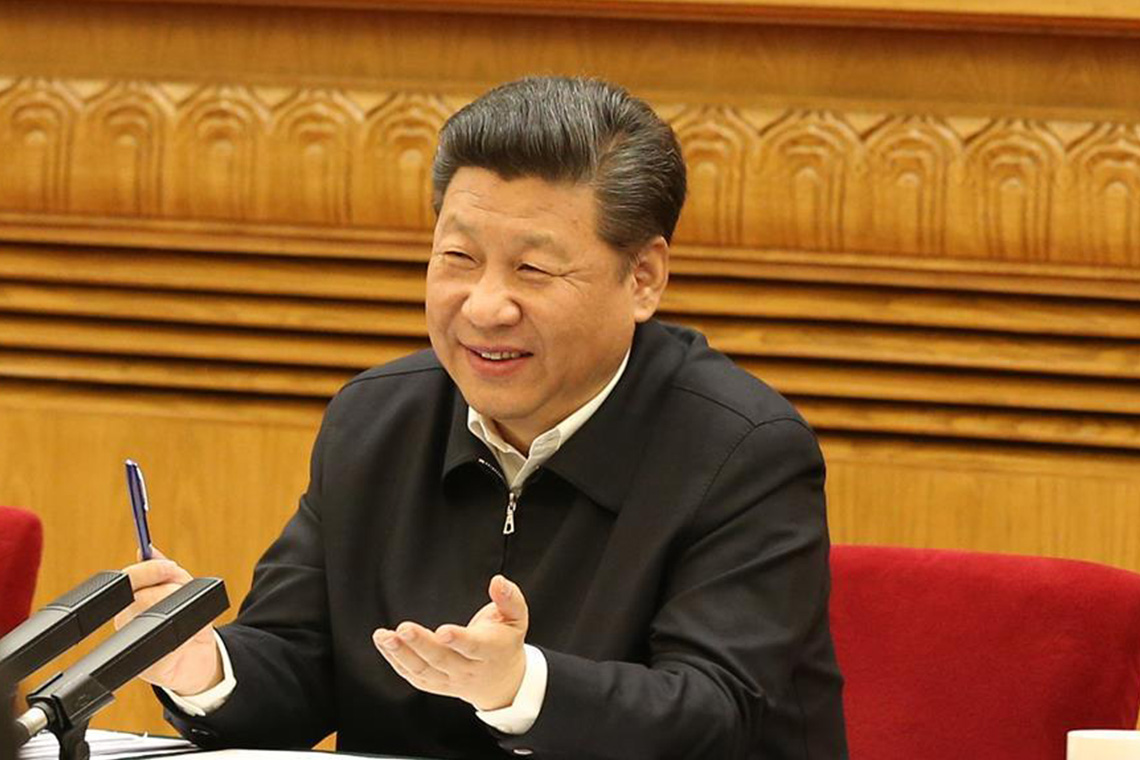No porn on WeChat for government officials
Top China news for April 18, 2017. Get this daily digest delivered to your inbox by signing up at supchina.com/subscribe.

Dear reader,
I am delighted to announce that the veteran China correspondent John Pomfret has joined The China Project as editor-at-large and will be a regular contributor. John is the author of the acclaimed books Chinese Lessons and The Beautiful Country and the Middle Kingdom: America and China, 1776 to the Present.
Today, we publish John’s story “Accomplishing what they could not at home,” which examines the role women have played in the history of U.S.-China relations.
This is one of a series of articles we are running in advance of the The China Project Women’s Conference on May 18 in New York. Others published so far are “The dire state of female representation in the Chinese government,” by Cheng Li, and “Chinese women are killing it in WeChat commerce,” by Simone McCarthy. Last week, we published a Sinica Podcast with Virginia Kamsky, who is mentioned in John’s article.
No vote rigging, rumors, or porn on WeChat for government officials
Xinhua News Agency and various state-run accounts on the social media and messaging app WeChat have laid out rules for government officials in an article (in Chinese) titled “Party officials also have red lines on WeChat: Eight things they absolutely must not touch!” The eight things are:
- Ridiculing Party policies
- Transmitting obscene images or videos
- Spreading rumors
- Illegally accepting electronic money transfers using WeChat “red envelopes”
- Using WeChat red envelopes to buy votes
- Leaking state secrets or confidential information from work units
- Illegally opening websites or WeChat stores
- Publishing other inappropriate information
In other news about WeChat, the China Daily reports that 62.4 percent of Chinese adults read ebooks and media using the app in 2016, “up 10.5 percentage points year on year.”
A year of Xi Jinping internet governance
On April 19 last year, Xi Jinping gave a speech on “internet governance.” While outside observers tend to focus on the security, censorship, and surveillance aspects of Xi’s pronouncements on the internet, Chinese state media has this week been celebrating the digital achievements of the 12 months since Xi’s speech. Xinhua News Agency has published an article (in Chinese) titled “Let the internet better enrich the people — on the one-year anniversary of General Secretary Xi’s important speech of April 19.” The China Daily has published a similar piece in English, which checks off specific success stories such as broadband services in rural areas, ecommerce pilot programs to reduce poverty, provincial governments allowing citizens to fill out forms online, electronic prescriptions from online hospitals, and at-home medical consultations for rural residents.
“Green cards” for foreigners remain merely symbolic
As part of its efforts to attract foreign talent to the workforce, Chinese state media has been promoting a new initiative to provide upgraded “green cards” to foreigners who qualify for permanent residency. Xinhua News Agency explains that “the ‘foreigner’s permanent residence card’ will be renamed as the ‘foreigner’s permanent residence identity card.’”
However, the changes are unlikely to make much of a difference to people who hold these green cards. Chinese green cards are valid for 10 years only, and do not offer any pathway to citizenship. Nor do they allow the holder to register companies or buy properties using the same procedures as Chinese citizens. The South China Morning Post points out that the theory is that green card holders can use “the card to buy train tickets, check into hotels, or open bank accounts,” but “in practice, given that the number of digits on the cards differs from mainland IDs and that many locals have never seen a green card, foreigners are still asked to show their passports.” Unless there are further changes to the system, the only real benefit of having a green card for foreign residents will remain to avoid yearly visa renewals.
North Korea: When “win-win” means “the Chinese win twice”
Little hard news is coming out of North Korea, but the tensions between the Hermit Kingdom and the U.S., with China standing uncomfortably in the middle, continue to take up media space. CNN says that “the United States is trying to degrade North Korea’s missile capabilities via hacking,” while the South China Morning Post notes that the U.S. naval flotilla that is apparently steaming to the Korean peninsula is “still thousands of kilometers from North Korea…reducing fears of an imminent U.S. attack.” The New York Times says (paywall) that the warships were not actually sailing to sailing “to deter North Korea, as the U.S. suggested.”
On Trump’s stated strategy of offering trade concessions to China in exchange for help with North Korea, Axios has talked to Richard McGregor, author of the influential book The Party: The Secret World of China’s Communist Rulers, who says: “The Chinese often talk about win-win outcomes, which, the cynics joke, means the Chinese win twice. By linking trade and North Korea, Trump is only making that outcome more likely.”
On the other hand, the New York Times reports (paywall) that “China’s best-known historian of the Korean War,” Shen Zhihua 沈志华, recently said that China “had fundamentally botched its policy on the divided Korean Peninsula.”
Will Xiongan New Area destroy a fragile wetland ecosystem?
Caixin reports that “environmentalists have raised a red flag on plans to include most of Northern China’s largest wetland” in the Xiongan New Area. The article says that “nearly 85% of Baiyangdian,” the lake that is Northern China’s largest freshwater body, “is located in Anxin County, one of the three rural counties in Hebei Province” that will be included in the planned new development.
—Jeremy Goldkorn, Editor-in-Chief
This issue of the The China Project newsletter was produced by Sky Canaves, Lucas Niewenhuis, Jia Guo, and Jiayun Feng. More China stories worth your time are curated below, with the most important ones at the top of each section.
BUSINESS AND TECHNOLOGY:
American businesses complain of worst barriers in decades in China
On April 18, the American Chamber of Commerce in China (AmCham) released its 2017 annual report (paywall), finding that more of its members than in decades are experiencing an unwelcoming business environment in China. Bloomberg reports that the chamber concluded, “The pace of economic reforms and market opening has been slow and faltering,” meaning that while factors such as regulatory transparency and intellectual property protection have improved, the overall perception of how much the Chinese government tilts the field in favor of Chinese businesses has increased greatly. Eighty-one percent of AmCham members said they felt less welcome in 2016 than in years before, indicating that 2017 may be perceived as the worst year yet unless regulatory trends change.
In announcing the results of the assessment, AmCham chairman William Zarit urged Washington to “use every arrow possible” against China to win back market access for American firms, rather than doggedly focusing on the U.S.-China trade deficit. Reducing the $347 billion trade deficit is the stated central goal of the ongoing “100-day” negotiations between the U.S. and China, which started on April 7 to avert a trade war after the Trump-Xi summit at Mar-a-Lago.
- Loan sharks targeted as problems mount / Caixin
“China’s banking watchdog is stepping up efforts to control the booming online market for cash loans as concerns grow over unscrupulous practices that are causing uproar among the public and threatening social stability.” - Amid clampdown, China companies continue to invest less abroad / Caixin
“Overseas direct investment by Chinese companies in nonfinancial sectors plunged 30.1% in March from a year ago, the Ministry of Commerce said Tuesday, following a clampdown to reduce capital outflows.” - China car recalls tilt heavily toward foreign brands / Financial Times (paywall)
- Ivanka Trump got Chinese trademarks approved, then dined with China’s president / Boston Globe
- Chinese bike-sharing start-up Ofo says it’s now worth more than $2 billion / CNBC
- Executive salaries at China’s largest state firms linked to ‘party building’ efforts / Reuters
- How to top the iPhone? For Foxconn, it’s with TVs / WSJ (paywall)
- Automakers charge ahead with electrics in China, even as policy drive slows / Reuters
POLITICS AND CURRENT AFFAIRS:
Will India attend the New Silk Road Summit?
China will host its “biggest diplomatic event of the year” next month with its friends and allies involved in the “One Belt, One Road” — aka the “New Silk Road” — initiative, Reuters reports. The South China Morning Post says that 28 heads of state mostly from Asia will come to Beijing for a summit on May 14-15 and notes the lack of major Western powers, though Reuters points out a more glaring blank spot on the list: India. The Times of India reports that “China is keen to persuade India to participate” in the New Silk Road Summit, and has already toned down its criticism of India for allowing the Dalai Lama to speak in the country earlier this month. Indian officials, however, reportedly insist they won’t participate in China’s summit “until China agrees to make a clear statement that it does not support Pakistan’s claim” to Kashmir, a disputed territory partially administered by both Pakistan and India that the China-Pakistan Economic Corridor passes through.
China business and political leaders are going to great lengths to promote the idea of a New Silk Road, sponsoring events ranging from massive multilateral summits to a Silk Road–themed photo exhibit in Atlanta. Within China, too, the government is connecting old trade routes and promising that economic rejuvenation will flow from the coastal areas to the center of Asia and beyond. Likely not helping China’s case to persuade India to join the action are new propaganda videos (in Chinese) from Chinese state-run media celebrating China’s friendship and economic cooperation with Pakistan, India’s primary geopolitical rival.
- China’s top corruption drama battles piracy / Caixin
A story about China’s public prosecutors who dredge up a series of scandals as they investigate shady land deals, organized crime, and SEO reforms, In the Name of the People, “a glossy Chinese television drama, inspired by the country’s ongoing anti-graft campaign…became an instant hit when it debuted on March 28 and has become one of the most-watched TV programs in Chinese history. Yet the entire 55-episode series, seen as groundbreaking for its lifesize portrayal of Chinese politics, was leaked on video-sharing sites and cloud storage services last week.” - Chinese asylum seeker detained in Taiwan / SCMP
“Mainland civil rights activist Zhang Xiangzhong was apprehended on Monday evening after he slipped away from his tour group.” - Fish Farmer From ‘Cancer Village’ Seeks Landmark Ruling Over Dead Daughter / Caixin
- China’s man on North Korea crisis cools heels in Beijing / Reuters
- In Indonesia, labor friction and politics fan anti-Chinese sentiment / Reuters
- 3 confirmed dead in NW China landslide – in Shaanxi Province / China Daily
- Four people under probe for substandard subway cables – in Xi’an / China Daily
SOCIETY AND CULTURE:
Pioneering medical treatments in Xinjiang
The spectacular highlands of Tibet, Qinghai, and Xinjiang are home to nomadic herders, their yaks and goats, and also a kind of tapeworm that spreads from wild rodents to livestock, dogs, and humans. The worms cause cysts in internal organs, resulting in a long, painful disease called echinococcosis, which usually leads to a premature death. In a rare feel-good story from Xinjiang, the Financial Times reports (paywall) on pioneering treatments that are being tested and used to successfully treat echinococcosis at a hospital affiliated with Xinjiang Medical University in Urumqi. In the early 2000s, the government began funding treatment with “the drug albendazole, which was developed in the 1970s and can slow the growth of cysts.” The FT says that “in the past decade, China has rolled out the largest prevention programme ever created for the disease, including drug treatment for millions of dogs and vaccination for livestock.” The program includes regular analysis of canine feces in Urumqi, and a surgical treatment for human patients that involves “removing the liver whole and stripping it of cysts before replacing it.”
- Going “gaga” in ads / Sinosplice
“There’s a word 嘎 (‘ga’) in Shanghainese…that just means ‘really’ or ‘very.’” - How Western fake news took over China’s social media / Sixth Tone
- China’s rapid urbanization has caused nearly three-quarters of its rural schools to shut down / Quartz
- Here’s how China changed a bunch of big Hollywood movies / A.V. Club
- This tiny book helped Chinese students cheat on their imperial exams hundreds of years ago / Shanghaiist







